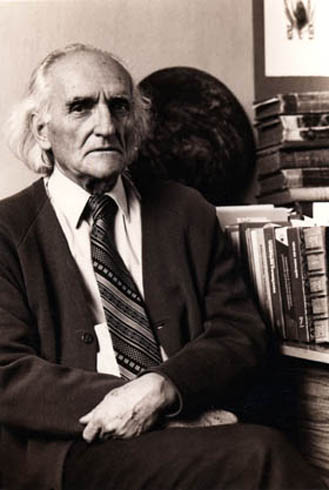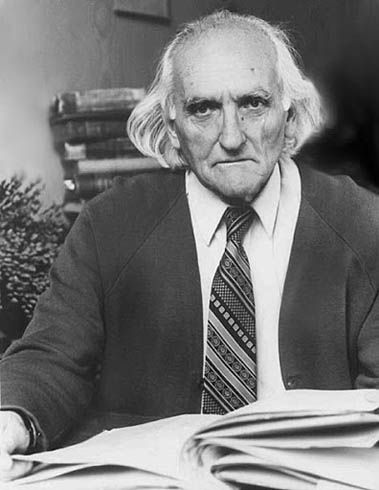Dashkevych, Yaroslav
Dashkevych, Yaroslav [Дашкевич, Ярослав; Daškevyč], b 13 December 1926 in Lviv, d 15 February 2010 in Lviv. Ukrainian historian, orientalist, and archeographer, author of more than 1000 scholarly publications, one of the leading historians of Ukraine after the Second World War; son of Roman Dashkevych and Olena Stepaniv. After graduating from the Academic Gymnasium of Lviv (1944), he studied at Lviv Medical Institute (1944), at the department of philology of Lviv University (1944-49), and at I. Gubkin Institute of Oil and Gas in Moscow (1949). Simultaneously he worked as a librarian and bibliographer at Lviv Scientific Library of the Academy of Sciences of the Ukrainian SSR. In December 1949, he was arrested by the NKVD for being the son of ‘a famous Ukrainian nationalist’ Olena Stepaniv and for the possession and distribution of ‘counterrevolutionary literature.’ In 1950, he was sentenced to ten years of imprisonment for his alleged anti-Soviet activities and he spent the next six years in various prisons and labor camps, among them in Kemerovo oblast of the RSFSR and in Karaganda, Kazakh SSR.
After his release in 1956, Dashkevych returned to Lviv where initially he had great difficulty to find academic employment. In 1957–66 he worked as a bibliographer at the Institute of Social Sciences of the Academy of Sciences of the Ukrainian SSR, at the time headed by Ivan Krypiakevych. In 1963, in the Armenian SSR, he defended his candidate of historical sciences dissertation dealing with Armenian colonies in Ukraine as presented in the sources and historiography of the 15th to 19th centuries. In 1967–72 he worked as a senior research associate at the Museum of Ethnography and Crafts of the Academy of Sciences of the Ukrainian SSR in Lviv. In 1973–8 he was a senior research associate at the Central State Historical Archive in Lviv. During these years his scholarly publications appeared in Ukraine’s major archeographic periodicals edited by the leading archeographer Ivan Butych—Istorychni dzherela ta ïkh vykorystannia and Naukovo-informatsiinyi biuleten' Arkhivnoho upravlinnia URSR. Dashkevych continued to be persecuted by the Soviet authorities and his career advanced very slowly; for a number of years (in 1966–7 and 1978–90) he was unemployed. It was only during the perestroika period in the late 1980s that he was recognized as one of the leading Ukrainian historians.
In 1990–1 Dashkevych became a founder and the first head of the Lviv branch of the Archeographic Commission of the Academy of Sciences of the Ukrainian SSR (from 1991 the Lviv branch of the Institute of Ukrainian Archeography and Source Studies of the National Academy of Sciences of Ukraine). In 1993 he became a deputy head of the same institute and a senior research associate at the Institute of East European Studies of the National Academy of Sciences of Ukraine where in 1994 he defended his doctoral dissertation. Despite Dashkevych’s official recognition as one of the leading historians in Ukraine, the conservative academic establishment blocked two attempts at electing him a corresponding member of the National Academy of Sciences of Ukraine. From the early 1990s Dashkevych also closely cooperated with the Shevchenko Scientific Society in Lviv as head of its Oriental Commission (from 1990), a member of its Presidium, and head of its Historical-Philosophical Section (from 1991). From 1995 he taught Ukrainian history and special historical disciplines at Lviv University and, from 1998 he also served there as the first Chair of Oriental Studies in the department of philology.
Dashkevych produced more than 1000 scholarly studies in the field of Ukrainian archeography, special historical disciplines (such as bibliography, diplomatics, and historical geography), Oriental studies, as well as the study of Ukrainian-Armenian, Ukrainian-Turkish, Ukrainian-Polish, and Ukrainian-Jewish relations. Of particular importance are his numerous studies dealing with Armenian colonies in medieval and early-modern Ukraine and of Ukrainian-Armenian relations: Armianskie kolonii na Ukraine v istochnikakh i literature XV–XIX vekov: Istoriograficheskii ocherk (Armenian Colonies in Ukraine in Sources and Literature in the 15th and 20th Centuries: Historiographical Survey, 1962); Ukrainsko-armianskie sviazi v XVII veke: Sbornik dokumentov (Ukrainian-Armenian Relations in the 17th Century: A Collection of Documents, 1969); ‘A Turkish Document in Ukrainian from the Mid-Sixteenth Century: On the Origin of the Ukrainian Cossacks,’ Harvard Ukrainian Studies, 1 (1977); Rus’ i Virmeniia: Konfesiini ta kul’turni kontakty IX – pershoï polovyny XIII stolit’ (Rus’ and Armenia: Religious and Cultural Contacts in the 9th to the First Half of the 13th Centuries, Zapysky NTSh, 1993); and Virmeny v Ukraïni: Zbirnyk naukovykh statei ta retsenzii, 1954–2009 rr. (Armenians in Ukraine: A Collection of Scholarly Articles and Reviews, 1954–2009; 2012). In these and other works he emphasized a significant role that Armenian communities played in economic and cultural life of Ukraine throughout centuries, as well as in the history of the Armenian diaspora.
One of Dashkevych’s seminal conceptual writings entitled ‘Ukraïna na mezhi mizh Skhodom i Zakhodom (XIV–XVIII st.)’ (Ukraine on the Frontier between East and West in the 14th to 18th Centuries, Zapysky NTSh, 1991) raised an issue of a ‘grand frontier’ separating sedentary and nomadic cultures and also urged Ukrainian historians to pay more attention to the diverse contacts between Ukraine and Orient. The article led to prolonged debates among historians of Ukraine on the place of Western and Eastern legacies in Ukrainian history. With regard to the issue of the formation of the Ukrainian national identity Dashkevych adhered to the primordialist point of view, according to which Ukrainians as an ethnic group with a degree of self-awareness had largely developed in the medieval period rather than in modern times. Yet he preferred concrete historical research to the more abstract philosophy of history, a view he expressed in his articles written in the 1990s, such as ‘Natsional'na samosvidomist' ukraïntsiv na zlami XVI–XVII st.’ (National Self-Awareness of Ukrainians in the Late 16th–Early 17th Centuries,1992) and ‘Mykhailo Hrushevs'kyi – istoryk narodnyts'koho chy derzhavnyts'koho napriamu?’ (Was Mykhailo Hrushevsky a Historian of the Populist or the Statist School? 1999).
During the last years of his life Dashkevych became a critical commentator of contemporary international and internal Ukrainian political developments, positioning himself, albeit implicitly, on the right wing of the political spectrum. For instance, he opposed globalization, criticized the European Union, and instead viewed the world as an arena of competing nationalisms (see his article ‘Doslidzhennia natsionalizmu. Vstupni uvahy’ [The Studies of Nationalism: Preliminary Considerations, 1995]). When writing about the Polish-Ukrainian conflict of the 1940s, particularly the communal violence in Volhynia in 1943, Dashkevych considered the militant behavior of Ukrainian residents as the justified response of the oppressed community to the repressive policies of Polish colonizers. Those policies culminated in the Operation Wisła after the Second World War, which, according to Dashkevych, amounted to the ‘liquidation of the centuries-long Ukrainian ethnic territory’ (see ‘Podzvinne operatsiï “Visla”’ [The Echo of the Operation Vistula, 1997]). Dashkevych, along with his long-time rival, historian Yaroslav Isaievych, personified the Lviv historical community from the early 1990s until 2010, a year when both of them passed away.
The selected works of Dashkevych appeared in several publications, such as Virmeniia i Ukraïna: zbirnyk naukovykh statei i retsenzii, 1954–1989 rr (Armenia and Ukraine: A Collection of Scholarly Articles and Reviews, 1954–1989, 2001); ‘…Uchy nelozhnymy ustamy skazaty pravdu’: istorychna eseïstyka (1989–2008) (‘Teach the Tell the Truth with the Candid Lips’: Historical Essays, 2011); and Maisternia istoryka (Historian’s Workshop, 2012). The most complete bibliography of his works was published in 2006.
BIBLIOGRAPHY
Iaroslav Romanovych Dashkevych:Biobibliohrafichnyi dovidnyk (Kyiv 1993)
Mappa mundi: zbirnyk naukovykh prats' na poshanu Iaroslava Dashkevycha z nahody ioho 70-richchia (Lviv–Kyiv–New York 1996)
Iaroslav Dashkevych: Biobibliohrafichnyi pokazhchyk (Lviv 2006)
Svarnyk, H. ‘Dashkevych Iaroslav Romanovych,’ Ukraïns'ki arkhivisty (XIX–XX st.): Biobibliohrafichnyi dovidnyk (Kyiv 2007)
Portnov, Andrii. Istoriï istorykiv. Oblychchia i obrazy ukraïns'koï istoriohrafiï XX stolittia (Kyiv 2011)
Serhiy Bilenky
[This article was written in 2018.]

.jpg)
